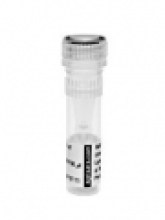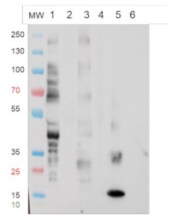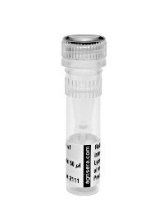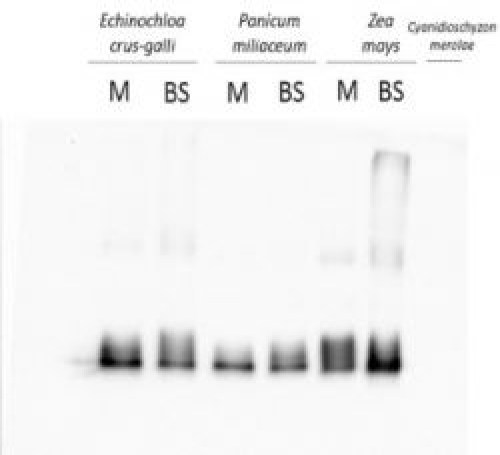
Anti-Lhca1 | PSI type I chlorophyll a/b-binding protein
(Cat#: AS01 005)
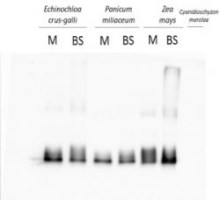
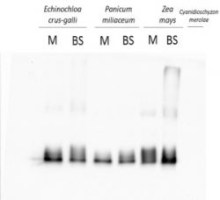
Description
- Immunogen: BSA-conjugated synthetic peptide derived from the Lhca1 protein of Arabidopsis thaliana UniProt: Q01667, TAIR: At3g54890. This sequence is highly conserved in Lhca1 proteins of angiosperms (monocots and dicots) and gymnosperms.
- Host: Rabbit
- Clonality: Polyclonal
- Purity: Total IgG. Protein G purified in PBS pH 7.4.
- Format: Lyophilized
- Quantity: 0.5 mg
- Reconstitution: For reconstitution add 100 µl of sterile water
- Storage: Store lyophilized/reconstituted at -20°C; once reconstituted make aliquots to avoid repeated freeze-thaw cycles. Please remember to spin the tubes briefly prior to opening them to avoid any losses that might occur from material adhering to the cap or sides of the tube.
- Tested applications: Western blot (WB)
- Recommended dilutions: 1 : 2000-1 : 5000 (WB)
- Expected | apparent MW: 25.99 | 22 kDa for Arabidopsis thaliana
- Confirmed reactivity: Arabidopsis thaliana, Arachis hypogaea, Bryopsis corticulans, Citrus retuculata, Colobanthus quitensis Kunt Bartl, Echinochloa crus-galli, Fortunella margarita Swingle, Guzmania hybrid, Hordeum vulgare, Lycopersicon esculentum (Solanum lycopersicum), Nicotiana tabacum, Oryza sativa, Panicum miliaceum, Picrorhiza kurroa, Physcomitrium patens, Pinus strobus, Pisum sativum, Phaseolus vulgaris, Posidonia oceanica, Solanum lycopresicum, Spinacia oleracea, Tillandsia flabellate, Triticale, Triticum aestivum, Zea mays
- Not reactive in: No confirmed exceptions from predicted reactivity are currently known
- The light-harvesting protein Lhca1 is one of the four main and highly conserved types of chlorophyll a/b-binding proteins (Lhca1-4) of the light harvesting antenna (LHCI) of plant photosystem I. Lhca1 is imported as a precursor from the cytosol into the chloroplast. Upon insertion into the thylakoid membrane Lhca1 forms a heterodimer (LHCI-730) with Lhca4 that associates with the PSI core close to PsaG and PsaF.A biochemical characterization of the plant LHCI antenna can be found in Klimmek et al. (2005) The structure of the higher plant light harvesting complex I: in vivo characterization and structural interdependence of the Lhca proteins. Biochemistry 44: 3065–3073
- Sakurabata et al. (2024). HASTY-mediated miRNA dynamics modulate nitrogen starvation-induced leaf senescence in Arabidopsis. Nat Commun. 2024 Sep 10;15(1):7913. doi: 10.1038/s41467-024-52339-w. Frangedakis et al. (2024). MYB-related transcription factors control chloroplast biogenesis. Cell: DOI:https://doi.org/10.1016/j.cell.2024.06.039. Hu et al. (2023). Drought affects both photosystems in Arabidopsis thaliana. New Phytol. 2023 Oct;240(2):663-675. doi: 10.1111/nph.19171. Epub 2023 Aug 2.Harchouni et al. (2022) Guanosine tetraphosphate (ppGpp) accumulation inhibits chloroplast gene expression and promotes super grana formation in the moss Physcomitrium (Physcomitrella) patens. New Phytol. 2022;236(1):86-98. doi:10.1111/nph.18320Espinoza-Corral & Lundquist. (2022) The plastoglobule-localized protein AtABC1K6 is a Mn2+-dependent kinase necessary for timely transition to reproductive growth. J Biol Chem. 2022 Apr;298(4):101762. doi: 10.1016/j.jbc.2022.101762. Epub 2022 Feb 22. PMID: 35202657; PMCID: PMC8956952.Sarvari et al. (2022). Qualitative and quantitative evaluation of thylakoid complexes separated by Blue Native PAGE. Plant Methods. 2022 Mar 3;18(1):23. doi: 10.1186/s13007-022-00858-2. PMID: 35241118; PMCID: PMC8895881.Xiong et al. (2022) a chloroplast nucleoid protein of bacterial origin linking chloroplast transcriptional and translational machineries, is required for proper chloroplast gene expression in Arabidopsis thaliana. Nucleic Acids Res. 2022 Jun 23;50(12):6715-34. doi: 10.1093/nar/gkac501. Epub ahead of print. PMID: 35736138; PMCID: PMC9262611.Kumari et al. (2021) In-depth assembly of organ and development dissected Picrorhiza kurroa proteome map using mass spectrometry. BMC Plant Biol. 2021 Dec 22;21(1):604. doi: 10.1186/s12870-021-03394-8. PMID: 34937558; PMCID: PMC8693493.
- Protein is processed into mature form (Jansson 1999).
Boca Scientific is your premiere source for high-quality, innovative solutions for Cell Biology, Molecular Biology, Immunology, genetics and other lab products and reagents. We bring leading-edge products from our own-line and around the world to laboratories in the US and Canada. Our goal is to offer excellent solutions to drive research and discoveries backed by superior customer support.

